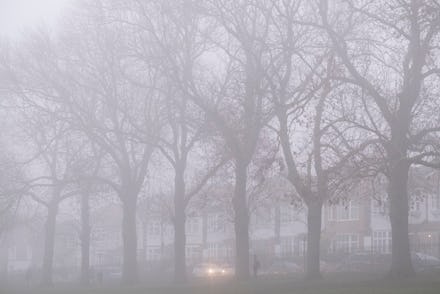A 9-year-old girl just became the first person to officially die from air pollution

In February 2013, 9-year-old Ella Kissi-Debrah suffered an asthma attack. The young girl living in the borough of Lewisham in southeast London was taken to the hospital, where she went into cardiac arrest and could not be resuscitated. The death was tragic and likely avoidable — not through medical care, but rather government intervention. Philip Barlow, the coroner at the London Inner South Coroner’s Court, announced Wednesday that Kissi-Debrah's death was caused in part due to exposure to excessive amounts of air pollution. The landmark decision is believed to make Kissi-Debrah the first person in the world to have air pollution listed as the cause of death on her death certificate.
Barlow and the Coroner’s Court spent two weeks examining Kissi-Debrah’s case, after her mother fought for years for medical experts to consider the role air pollution played in her daughter's death. Barlow concluded that the 9-year-old child was exposed to nitrogen dioxide and particulate matter pollution that was determined to be in excess of both the United Kingdom's legal limits and the guidelines established by the World Health Organization. The emissions are believed to stem largely from traffic emissions.
“I will conclude that Ella died of asthma, contributed to by exposure to excessive air pollution,” Barlow said, as he laid out the results of the inquest, according to The Independent. Officially, Kissi-Debrah's death will be recorded as the result of acute respiratory failure, severe asthma, and air pollution exposure.
The findings run in contrast, or at least expand upon, the original findings of the coroner's office in 2014, which ruled that Kissi-Debrah died of acute respiratory failure but did not assign any cause beyond that. However, new evidence presented in the latest inquiry into her death showed that there were dangerous levels of air pollution near her home. Investigators working on the inquiry into Kissi-Debrah's death found that she and her family lived near a well-trafficked area where, from 2006 to 2010, pollution consistently exceeded the annual legal limit allowed in the U.K.
Medical experts believed that this long-term exposure to damaging air pollution may have been responsible for Kissi-Debrah’s harrowing history of lung problems. According to The Guardian, the young girl was admitted to the hospital on nearly 30 occasions due to severe asthma attacks over her last two years of life. Her lungs collapsed, at times partially and times fully, five times. Investigators and medical experts working on the case determined that the child's attacks were not triggered by pollen or respiratory infections, which are the typical cause of asthma attacks, but rather by exposure to nitrogen dioxide and particulate matter pollution. They also discovered a pattern in her history of attacks: They worsened in the winter, when the level of air pollution was spiking.
With this new information and the additional context about excess air pollution plaguing the London neighborhood that Kissi-Debrah called home, the coroner was able to determine that the young girl's death was at least in part the result of a failure to address air pollution. “The whole of Ella’s life was lived in close proximity to highly polluting roads. I have no difficulty in concluding that her personal exposure to nitrogen dioxide and [particulate matter] was very high,” Barlow said, according to The Guardian.
Air pollution has been considered a public health crisis in London for decades, and while the emissions levels in the city have plunged over the last four years, it is still considered to be one of the worst cities in all of Europe when it comes to the issue. This experience is not unique to London, though. Many major cities, including in the United States, have excess amounts of air pollution that have adverse effects on the health of citizens. More often than not, those most harmed by the pollution are communities of color. Kissi-Debrah's death is a stark reminder that pollution does not do harm in the abstract, it has real and direct consequences on those who have no power in stopping or avoiding it.